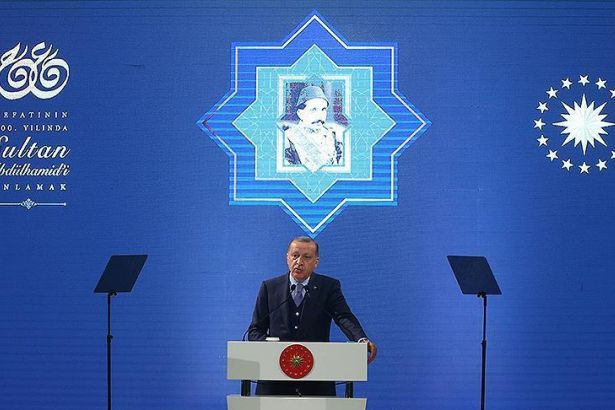President Erdoğan: Republic of Turkey is continuation of Ottomans

The Republic of Turkey is a continuation of the Ottoman Empire, President Recep Tayyip Erdogan said on Saturday.
"The Republic of Turkey, just like our previous states that are a continuation of one another, is also a continuation of the Ottomans," Erdoğan said in remarks he made during a commemoration ceremony to mark the centenary of the death of Ottoman Sultan Abdulhamid II at the Yıldız Palace in Istanbul.
"Of course, the borders have changed. Forms of government have changed... But the essence is the same, soul is the same, even many institutions are the same."
Erdoğan added this is why Sultan Abdulhamid is one of the "most important, most visionary and most strategic minded" individual that made his mark in recent 150 years. Sultan Abdulhamid II, the son of Sultan Abdulmecid, died in 1918, and was the 34th sultan of the Ottoman Empire.
Abroad, Abdulhamid was nicknamed the Red Sultan or Abdul the Damned due to the massacres committed against minorities during his rule and use of secret police to silence dissent and republicanism. He adopted Pan-Islamism; since Ottoman sultans beginning with 1517 were also nominally Caliphs, he wanted to promote that fact and emphasized the Ottoman Caliphate.
Erdoğan also criticized those with "bigoted" viewpoints about Sultan Abdulhamid. "Some people insistently try to start this country's history from 1923. Some unrelentingly try to break us from our roots and ancient values," he added.
FAILURE OF NEO-OTTOMANISM
Neo-Ottomonism is a policy that fits both the Turkish capitalism which was trying to find new opportunities and the big monopolies. However, this policy collapsed the General Secretary of Communist Party of Turkey (TKP), Kemal Okuyan, said in April 2017 in an interview with soL.
"For several reasons. First of all, the so-called Arab Spring, which turned to be the manipulation of the poor Arab peoples' justified reaction to some Arab regimes by the imperialists failed in Syria. And of course, Turkish society showed in different ways that an Islamic political system is not acceptable. AKP [Turkey's ruling party] got rid of secularism but failed to establish an Islamic rule. Turkey is floating in that sense and the only force that can unlock this lock is the working class," Okuyan said.
"AKP dared and managed to destroy the main gains of the bourgeoisie revolution in Turkey in the 1920’s! They managed to destroy all that but they have no strength to establish a new system! Turkish capitalism is trapped and this is one of the reasons for our optimism," he added.
A BRIEF HISTORY OF FACTS
The Turkish War of Independence was fought in the name of creating a new, independent republic, not in the name of restoring the Ottoman Empire. One of the new republican government's first acts was to make sure there was no longer any empire to restore.
On 1 November 1922, Turkish Parliament in Ankara formally abolished the Sultanate, thus ending 623 years of monarchical Ottoman rule. The Turkish national movement formed a Turkish Grand National Assembly, and secured formal recognition of the nation's independence and new borders in 1923, through the Treaty of Lausanne.
Parliament abolished the Caliphate on March 3, 1924. Republic revolutions were a series of political, legal, religious, cultural, social, and economic policy changes that were designed to convert the new Republic of Turkey into a secular, modern nation-state.
The Ottomans had lost World War I, which resulted in the dismantling of their empire under the terms of the armistice and the 1920 Treaty of Sèvres that divided the empire’s lands into European spheres of influence.
The signatories of the treaty were stripped of their citizenship by the parliament in Ankara, led by Mustafa Kemal Atatürk.
Atatürk, the founder of the modern Republic of Turkey, had organized the resistance in Anatolia, the goal of which was to end the imperialist occupation of the country and to stop it from being partitioned. However, under imperialist countries direction, the Sultan pledged to suppress such movements. The Ottoman Sultan's government in Istanbul sentenced Atatürk to death in absentia, but it failed to prevent him from building up both military and popular support.
The last Sultan left Turkey in a British battleship on his way to Malta.




